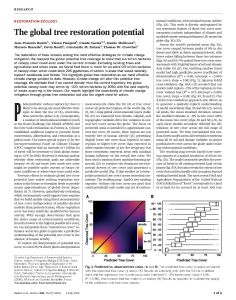Зарегистрируйтесь на getAbstract, чтобы получить доступ к этому краткому изложению.

Зарегистрируйтесь на getAbstract, чтобы получить доступ к этому краткому изложению.
Jean-Francois Bastin, Yelena Finegold, Claude Garcia, Danilo Mollicone, Devin Routh, Constantin M. Zohner, Thomas W. Crowther and Marcelo Rezende
The Global Tree Restoration Potential
Science, 2019
Что внутри?
Global reforestation provides a promising strategy for battling climate change – if it begins now.
Recommendation
Planting trees remains one of humanity’s most promising strategies for reversing the effects of climate change. This report, compiled by a group of leading environmental scientists, delineates a global map of regions where almost a billion hectares of tree canopy could be strategically established. The experts warn that if such a plan is not initiated immediately, CO2 levels could continue to negatively affect worldwide climate. Their map offers a hopeful plan, along with an urgent call to action.
Summary
About the Authors
Jean-Francois Bastin is an ecologist and a geographer using remote sensing to study the relationship between global change and terrestrial ecosystems. Other authors include Yelena Finegold, Claude Garcia, Danilo Mollicone, Marcelo Rezende, Devin Routh, Constantin M. Zohner and Thomas W. Crowther.



















Comment on this summary